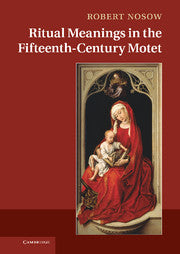
CAMBRIDGE UNIVERSITY PRESS - 521
Ritual Meanings in the Fifteenth-Century Motet
Publisher: Cambridge University Press
Ritual Meanings in the Fifteenth-Century Motet
Juilliard Store
144 West 66th Street
New York NY 10023
United States
Choose options
Ritual Meanings in the Fifteenth-Century Motet
Juilliard Store
144 West 66th Street
New York NY 10023
United States
Ritual Meanings in the Fifteenth-Century Motet
Juilliard Store
144 West 66th Street
New York NY 10023
United States
The first full-length study of how motets were used and performed in the fifteenth century, this book dispels the mystery surrounding these outstanding works of vocal polyphony. It covers four areas of intense compositional activity: England, the Veneto, Bruges and Cambrai, with reference to the works of Dunstaple, Forest, Ciconia, Grenon and Du Fay. In every documented instance, motets functioned as ceremonial vehicles, whether voiced in procession through the streets of a city or the chapel of a king, at the guild chapel of a parish church or the high altar of a cathedral. The motet was an entirely vocal genre that changed radically during the period 1400 to 1475. Robert Nosow outlines the motet's social history, demonstrating how the incorporation of different texts, musical dialects, cantus firmus materials and melodic styles represents an important key to the evolution of the genre, and its adaptability to widely variant ritual circumstances.
